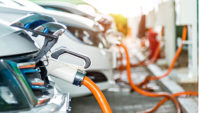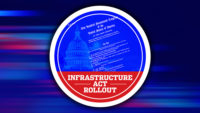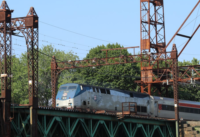As part of the Biden administration’s push to boost the use of electric vehicles, the U.S. Dept. of Transportation has awarded $622.6 million to 47 projects that aim to spur construction of several thousand more electric vehicle charging and hydrogen fueling stations around the country.
The grant-winning projects, which DOT’s Federal Highway Administration announced on Jan. 11, are in 22 states and Puerto Rico. They are the first awards from the 2021 Infrastructure Investment and Jobs Act’s Charging and Fueling Infrastructure program.
In all, the discretionary-grant program will total $2.5 billion over five years. The new awards draw from fiscal year 2022 and 2023 funds.
DOT Secretary Pete Buttigieg said in a Jan. 10 media briefing to preview the announcement that the group of grants should support 7,500 new charging ports. That represents a modest 4% gain over the total number of stations in place by the end of 2023.
But Buttigieg said the new projects will make it "easier, more affordable and more convenient for people to charge EVs where we live, where we work and where we shop—wherever we need to charge."
Ali Zaidi, the White House National Climate Advisor, told reporters that the U.S. is on a track to exceed President Joe Biden’s goal of 500,000 chargers by 2030.
Zaidi said that as of the end of 2023, the number of chargers in place had risen to 168,426 nationwide, from 96,243 stations in 2020, an increase of 75%.
The increase in building charging stations is one aspect of major changes in engineering and construction flowing from the rising use of electric vehicles.
The new FHWA grant awards fall under two categories, with $311 million going to 36 “community” projects in urban and rural locales. They will include what FHWA called "high-use" sites, such as schools, parks, libraries and multi-family housing.
The other $312 million is for 11 projects on roads DOT has designated as alternative fuel corridors. The grants aim to close gaps in the core national network for EVs and hydrogen fuel, according to DOT.
Grant recipients include state, city, county and regional agencies, two universities and two Indian tribes.
Buttigieg said that 70% of of the $623 million will go to projects located in in disadvantaged communities. The emphasis on such areas has been a Biden administration priority.
The federal grants, awarded on a competitive basis, were in great demand. FHWA said it received 535 applications, seeking a total of $3.7 billion.
Top Grantee: North Texas Government Council
The biggest winner in the new grant competition is the North Central Texas Council of Governments, which received the largest individual grant, $70 million, in the corridor category.
According to FHWA, the grant will help to construct up to five hydrogen fueling stations for medium- and heavy-duty trucks in the Texas Triangle, which includes the Dallas-Fort Worth, Houston, Austin and San Antonio metro areas.
The Texas council also received a second grant, $15 million in the community category. According to FHWA, those funds will go toward installing as many as 100 charging ports at publicly available charging stations in the 16 counties in the Dallas-Fort Worth area.
The second-largest award is a $63.8-million corridor grant to the New Mexico DOT.
That project includes building two EV charging centers for medium- and heavy-duty commercial vehicles on Interstate-10.
The third-largest grant is a $56-million corridor award to the San Joaquin Valley Unified Air Pollution Control District in California to build two truck charging sites in Taft and Gustine, Calif.
According to FHWA, the project includes 90 DC fast chargers for passenger vehicles, 85 DC fast chargers for medium- and heavy-duty trucks and 17 Megawatt Standard Chargers (MCS) systems.
Puerto Rico's Highway and Transportation Authority (Autoridad de Carreteras y Transportacion), is receiving a $51.5-million corridor grant to install fast EV charging ports at 10 sites along a major highway, FHWA said.
California had the largest number of grants, with 10, followed by Washington, with four. Arizona, New Mexico, New York and Texas each won three grants.
Supplement to State Formula Grants
The Charging and Fueling Infrastructure funds supplement IIJA's larger $5-billion National Electric Vehicle Infrastructure, or NEVI, program, through which FHWA allocates to states by formula.
FHWA last year distributed an initial $615 million to states under NEVI. The agency estimates future allotments at $885 million for each of the next four years.
FHWA administrator Shailen Bhatt said that several states have broken ground or announced EV charger projects in recent months. Bhatt said he expects there to be "a wave of new chargers" coming up.
According to the U.S. Dept. of Energy, as of Dec. 15, two states had opened charging stations and such facilities were under construction in Maine, Pennsylvania and Vermont.
DOE said that in all, 28 states have issued solicitations for charger projects and more than a dozen of those have awarded contracts or have agreements in place.






Post a comment to this article
Report Abusive Comment